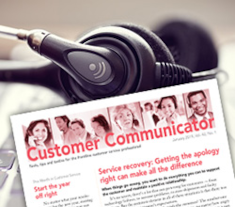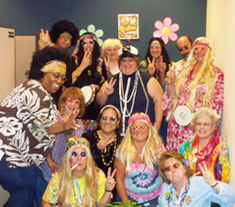Give a Verbal Receipt
 In stores and restaurants of all kinds the transaction ends with a receipt. It’s like a summary of what went before — you selected 2 percent milk, Greek yogurt, and a bunch of bananas. You paid $6.95. In the January issue of Customer Communicator, the training and motivation newsletter for frontline reps, author Richard Gallagher, says…Continue reading
In stores and restaurants of all kinds the transaction ends with a receipt. It’s like a summary of what went before — you selected 2 percent milk, Greek yogurt, and a bunch of bananas. You paid $6.95. In the January issue of Customer Communicator, the training and motivation newsletter for frontline reps, author Richard Gallagher, says…Continue reading









 Written language is always changing and evolving. One of the biggest factors driving change today is the use of texting and messaging. So called "text-speak" has evolved to be quick and informal and is often marked by abbreviations and acronyms (lol, BTW, IDK, etc.), limited use of punctuation and capitalization, informal greetings, and the use…
Written language is always changing and evolving. One of the biggest factors driving change today is the use of texting and messaging. So called "text-speak" has evolved to be quick and informal and is often marked by abbreviations and acronyms (lol, BTW, IDK, etc.), limited use of punctuation and capitalization, informal greetings, and the use… Adding emphasis to individual words and phrases is essential to clear communication. Emphasis will focus the customer’s attention, clarify meaning, and make your message more engaging. The January issue of Customer Communicator, the training and motivation newsletter for frontline reps, highlights the importance of emphasis in avoiding miscommunication. The following example shows how the meaning of…
Adding emphasis to individual words and phrases is essential to clear communication. Emphasis will focus the customer’s attention, clarify meaning, and make your message more engaging. The January issue of Customer Communicator, the training and motivation newsletter for frontline reps, highlights the importance of emphasis in avoiding miscommunication. The following example shows how the meaning of… How do you know when you’re doing an excellent job serving customers? A compliment from a coworker or praise from a supervisor are great indicators. But there’s one more important way. In the December issue of Customer Communicator, the training and motivation newsletter for frontline reps, service consultant Jeffrey Gitomer reminds reps that they also get…
How do you know when you’re doing an excellent job serving customers? A compliment from a coworker or praise from a supervisor are great indicators. But there’s one more important way. In the December issue of Customer Communicator, the training and motivation newsletter for frontline reps, service consultant Jeffrey Gitomer reminds reps that they also get… Each week we share practical tips and techniques from the pages of Customer Communicator — the digital newsletter for frontline reps. To wrap up 2025, we invite you to read any of the tips you may have missed and to subscribe to Customer Communicator for 2026. In each issue of Customer Communicator your team will find skill-building articles, practical tips, expert advice, and…
Each week we share practical tips and techniques from the pages of Customer Communicator — the digital newsletter for frontline reps. To wrap up 2025, we invite you to read any of the tips you may have missed and to subscribe to Customer Communicator for 2026. In each issue of Customer Communicator your team will find skill-building articles, practical tips, expert advice, and…